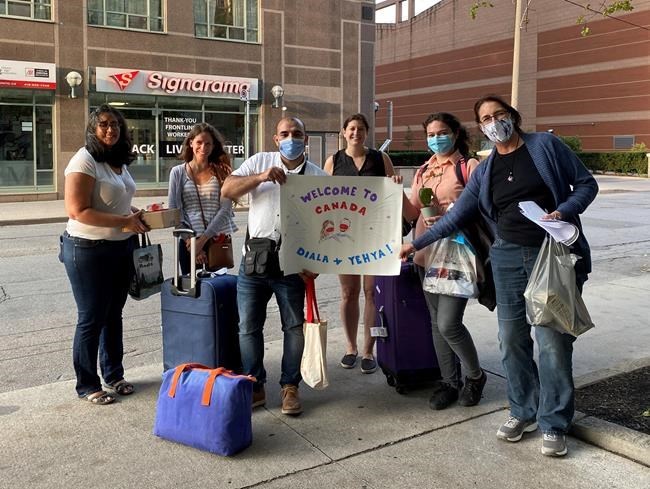OTTAWA —
Halfway through their 14-day quarantine period, Diala Charab and Yehya Al-Ayoubi are excited to start working as health-care aides after arriving Sunday from Lebanon.
Despite COVID-19 travel restrictions that prevent most people from coming to Canada, the two nurses were exempted, resettled under a pilot project to bring skilled refugees to the country.
"Diala got her visa during the (COVID-19) lockdown … I got the visa after the Beirut explosion." Al-Ayoubi said.
"Things were hectic, but we just wanted to come here and be beneficial, productive people in this society."
Charab, 25, and Al-Ayoubi, 29, will join the staff of VHA Home HealthCare in Toronto as personal support workers.
Ernesto Sequera, VHA's human-resources manager, said in a statement that the company is happy to bring health care workers to Canada to address the urgent need for more trained home-care professionals during the pandemic.
Charab and Al-Ayoubi didn’t know each other when they applied separately to immigrate to Canada last year, but they landed here as a couple.
"It’s like fate," Al-Ayoubi said. “The day that we got engaged, (they) called us for a job opportunity.”
The two newcomers worked as nurses in Lebanon during the first wave of COVID-19.
"I don’t have any concerns about it," Charab said. "You just have to take your precautions and stay safe."
But the travel restrictions the government put in place to fight the spread of COVID-19 have limited the numbers of newcomers to Canada.
"The current pandemic presents new challenges," said Immigration Minister Marco Mendicino in a statement Friday.
Mendicino said Canada is working with the United Nations Refugee Agency and the International Organization for Migration as the two organizations slowly resume operations. Canada wants to resettle refugees where conditions allow, making sure they have the support they need.
The two Palestinian refugees were able to come to Canada as skilled workers thanks to the help of Talent Beyond Boundaries, a non-profit organization supporting displaced people to secure jobs and immigrate to safe countries.
"Traditionally, the way that refugees have been able to move to a safe country, like Canada, has been through humanitarian resettlement," said Dana Wagner, the organization’s director in Canada. "But, unfortunately, resettlement is a very limited option."
The United Nations estimated there were 26 million refugees around the world at the end of last year. Out of 1.4 million refugees in urgent need of resettlement in 2019, only 63,696 were resettled through the UN Refugee Agency.
The largest number of resettlements last year were in the United States, followed by Canada, the United Kingdom, Sweden and Germany, according to the agency.
"The number of people out there is so immense, and we need new safe and legal mobility options for people," Wagner said.
Talent Beyond Boundaries works with countries — including Canada, the U.K. and Australia — to establish programs so refugees can apply for jobs in a safe countries. Once they're hired, they can immigrate through an economic immigration pathway, like any other skilled worker.
Canada launched a pilot project in 2018 to bring in 10 to 15 skilled refugees who meet the requirements of Canada’s economic immigration programs.
In June, the government extended the project for two more years to admit up to 500 applicants.
The extension makes Canada’s project the largest of its kind globally, Wagner said.
"Australia has a pilot project of 100 principal applicants, and U.K. government officials are exploring this work as well," she said. "Other countries are watching this right now."
Canada’s economic immigration system was not designed to include refugees, so there are many unintended barriers, she said.
"Almost all of our immigration pathways require that you have a current passport, and a lot of refugees have expired passports and no ability to renew it."
Current immigration systems exclude talented people who should be able to compete for jobs, Wagner said.
"These are highly talented people who have a lot to contribute, and who have a need for a secure place to grow their careers and their lives."
The organization found through a survey of candidates that people are less likely to consider an irregular migration option — crossing borders without permission — if they know that economic migration is a possibility.
The organization has helped only nine applicants come to Canada under the program so far.
"When you include family members, that's 22 people. So, 22 former refugees are now in Canada,” Wagner said. “But we have a much larger pipeline of people who are in an immigration process right now."
This report by The Canadian Press was first published Sept. 19, 2020.
———
This story was produced with the financial assistance of the Facebook and Canadian Press News Fellowship.
Maan Alhmidi, The Canadian Press



